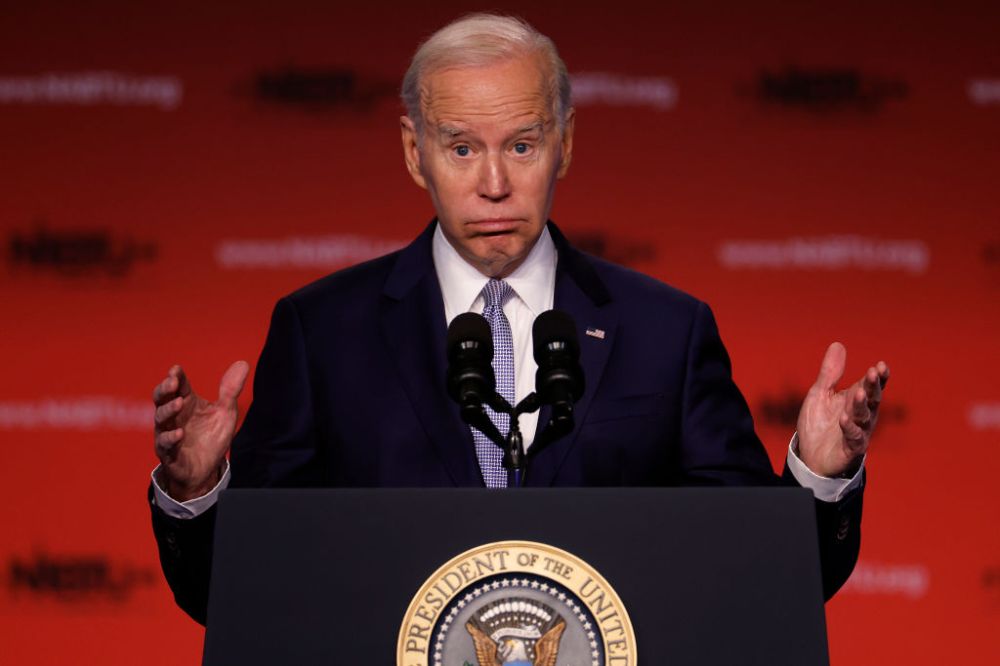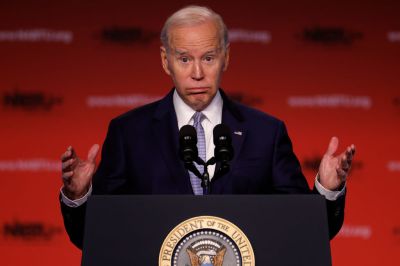Hi,
I have two separate things I want to vent about, but in deference to my principled both sides-ism, I will endeavor to connect them so as to ensure I annoy everyone.
Let’s start with Trump.
Here’s a hypothetical ripped from the headlines. Let’s say Donald Trump took home the “NOC List” of Mission Impossible fame that contains the names of all our secret agents around the world. The list—duh—is classified. Everyone with an ounce of common sense understands why it’s classified. Now, imagine Trump says it’s fine for him to have it because he declassified it before he left office. Let’s even say he actually did. According to Trump’s defenders, it’s fine for him to have it because it’s no longer classified. Indeed, because it’s no longer classified it’s fine for him to show it to people, or leave it by the crapper at Mar-a-Lago for one of the Chinese agents prowling the resort who hasn’t been caught yet.
But here’s the thing: The actual information on the list is still every bit as sensitive and important as it was when it was classified. Declassifying something isn’t a magical spell that renders the gold of sensitive information into unimportant lead. If the Chinese or Iranians or North Koreans got their hands on it, they wouldn’t be like, “Damn, if it was still classified, we could capture, torture, and execute these imperialist dogs. But now that the list has been declassified, it’s fine for the CIA to have operatives here. Once again Trump has outplayed us. Maybe next time.”
And yet to listen to Trump and his defenders, it seems as though they think he did nothing wrong so long as he uttered the Charm of Making or even just “mentally” declassified the documents at the center of his most recent indictment before he left office. In other words, even if Trump wasn’t lying—and he is so obviously lying—about having declassified everything, what he actually did is indefensible.
This gets all of the causality backward. Our enemies don’t want to know our battle plans because they’re classified, we classify our battle plans in an effort to keep our enemies from, like, knowing our battle plans.
This is a small, but very important, example of the way we talk about words as if they have power independent of the things they describe.
Making matters worse, Trump hasn’t actually been charged with “mishandling classified documents” as a legal matter. He’s been charged with 31 counts of “willful retention of national defense information” under the Espionage Act. The other six charges relate to obstruction and making false statements. Yes, presumably all of the national defense information is classified—as it should be—but the fact that it’s classified is irrelevant to the criminal charges. Yet virtually every single news report uses the phrase “mishandling classified documents.” The phrase is colloquially correct—he was mishandling documents that were classified—but the fact that they were classified isn’t relevant.
I know it’s hair-splitting, but constantly talking about “mishandling classified documents” makes Trump’s—false, or at least utterly implausible and unproven—defense (that he declassified all of these documents so it doesn’t matter) sound important when in fact it’s a red herring.
Finally, the idea that the Presidential Records Act allows him to take agency records and sensitive material home with him simply by claiming they’re “personal” turns the law on its head. The whole point, as Bill Barr keeps explaining, was to prevent presidents from taking such material home by proclaiming it’s personal. Trump’s whole “my boxes” riff is an assertion of a president’s monarchical-magical power over the law.
The square root of a duck smells orange.
Now let’s swing leftward but stay on the topic of words.
I chuckled at this story from Axios: “Biden’s weird words.”
There’s a whole genre of mainstream media outlets struggling with the question of how to report on the fact that the current president of the United States often says things that sound like World War II resistance code or catchphrases intended to trigger sleeper agents in the Cold War. “The fat man bathes in dirty moonlight,” “The goat asked for a receipt,” “The nipple is bright. Repeat: The nipple is bright!”
Now, he didn’t actually say any of these things, but who can really argue that it’s beyond the realm of imagination?
Last Friday, Biden concluded a speech on gun violence by declaring, “God save the queen, man.”
Just for context, the queen (of England) is dead and proud Irishmen rarely said that when she was alive.
Anyway, the White House has declined to explain what the president meant, in part because apparently nobody has any idea.
In keeping with Axios’ Smart Brevity® format, they offer this explanation for “Why it Matters” ©
Biden’s quirky aphorisms are sometimes weaponized by Republicans to insinuate the 80-year-old president is in mental decline. But Biden has been using unique phrases for years — but even some of his aides aren't exactly sure what he means by them.
So, the only reason this stuff matters—or at least the only reason fit to print—is that Republicans might use it to their advantage by insinuating that “the 80-year-old president is in mental decline.” In other words, but for the potential for Republican pouncing, it really doesn’t matter if the leader of the free world unleashes sentences like he’s a coked-out mongoose running through an infectious disease lab.
After all, Axios notes that Biden has been using “unique phrases” for years so there’s no reason other than Republican cynical partisanship to care about it at all.
I’m old enough to remember the endless liberal bleating about “Bushisms.” Heck, “Bushism” has a Wikipedia page. Slate had a regular “Bushism of the Week” feature, which it compiled into a book. But type “Bidenism” into Wikipedia’s search tool and you get redirected to a very earnest “Political Positions of Joe Biden” page. If Axios existed back then, I doubt they’d run an article saying the only reason that Bush’s malapropisms mattered is that they provided an opportunity for Democrats to pounce.
Now, in fairness to the folks at Axios, they have a point—one I’ve been making for years. Biden has been saying crazy stuff—and making up crazy fictional anecdotes—all his professional life. As I wrote 11 years ago:
Biden’s logorrhea dementia is the most popularly diagnosed malady in political life since Bill Clinton’s priapism. As a Senate committee chairman, he would often exhaust nearly all of his question time rhetorically wandering off like an Alzheimer’s patient in the snow, only to come to his senses at the last second and ask an angry question of the stunned witness or nominee. The poor fellow in the hot seat would usually be caught off guard thanks to the soporifically mesmerizing power of Biden’s enormous teeth, which he flashed throughout his sentences like a semaphore to alert the audience: “I can’t stop this thing!”
So, yes, it’s true as a matter of basic logic that you can’t claim his weird utterances are proof of senility if your only evidence is something he’s been doing since he was a young man. It’s like arguing that a lifelong fat man has suddenly gotten fat in old age. But that doesn’t mean the argument he’s showing his age is wrong either.
I don’t want to dwell on that because at this point you either see the signs or you don’t. I think the vast majority of Democrats and Republicans alike see it plainly, they just differ on how much of a problem they think it is.
But what’s remarkable to me is how so many people think “He’s said crazy and untrue things all his life” is some kind of defense. Imagine recommending a surgeon to a friend. He visits his office and, afterward, says to you, “Nice guy. But man, he’s really old. And he kept saying ‘God save the queen’ and called me a ‘dog-faced pony soldier.’ Then he told me this wild story about how he dated Katherine the Great in high school.”
Would your friend be reassured if you replied, “Yeah, he’s been doing that all his life, but you should totally let him do your heart bypass surgery”?
Now, being a politician isn’t analogous to being a surgeon. Surgeons use scalpels and other pointy and sharp things to take stuff out of your body or tie torn squishy stuff back together (sorry for the medical jargon). Meanwhile, the primary tools for politicians are these things called “words.” And Biden uses words the way toddlers use the stuff in your house’s junk drawer. For toddlers it’s great fun to have a tea party or game of checkers with a hammer, a GI Joe doll, a D battery, and a bottle of glue. It’s cute when, after the hammer wins, the toddler declares, “God save the queen.” But few parents would say, “Let’s give her the nuclear codes” or “Put him in charge of the checkbook.”
Now, that’s obviously unfair to a certain extent. But I think you get the point. Words matter.
Word magic.
In fact, the belief that words matter has long been a centerpiece of progressive ideology. “Words hurt” is a good shorthand for a huge swath of their project over the last couple decades. I haven’t forgotten the endless feting of George Lakoff, the linguist who insisted that all that was required to get Americans to love trial lawyers was to rebrand them as “community protection attorneys” or that people would be fine with higher taxes if we just called them “dues.”
We don’t have to reprise all the stuff about “LatinX” or “Birthing Persons.” But just think about how much of the country’s mental and journalistic bandwidth has been consumed by the importance of pronouns. Just last week, a federal judge ruled that wearing a T-shirt in school that says “there are only two genders” amounts to an “invasion of the rights of other students to a safe and secure educational environment.”
In vast swaths of American life these days we argue about words as a substitute for arguing about reality. Words have become magic incantations and alchemy spells intended to transmogrify facts to fit some theory of how the world should work. One of my great frustrations with much of the American right these days is that many conservatives have surrendered to this practice while complaining about it at the same time (after all, a lot of Critical Trump Theory is just right-wing postmodern LARPing). Just today, Elon Musk announced that “cis” and “cisgender” are “slurs” that violate Twitter’s free speech policies. Another victory for “words hurtism.”
I have more to say on this point but I gotta go, so I’ll save it for a future “news”letter or podcast or giant yellow bird with Atari 2600 consoles for feet. God save the queen.







Please note that we at The Dispatch hold ourselves, our work, and our commenters to a higher standard than other places on the internet. We welcome comments that foster genuine debate or discussion—including comments critical of us or our work—but responses that include ad hominem attacks on fellow Dispatch members or are intended to stoke fear and anger may be moderated.
With your membership, you only have the ability to comment on The Morning Dispatch articles. Consider upgrading to join the conversation everywhere.